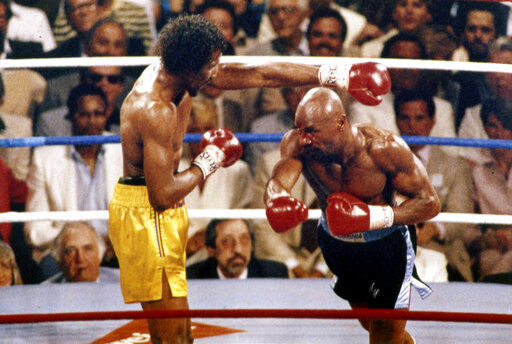
I knew him before and after he was Marvelous, but even before Marvin Hagler legally added the alliterative “Marvelous” to his name, he was a master in the ring, someone destined for greatness for the way he used his fists and his heart.
Hagler and I grew up in boxing on parallel tracks, him as one of the sport’s future greats, me with a pen in hand. We were both from the Boston area, so we overlapped early, and since Boston was no hotbed in the game like a Philadelphia or New York, rooting for Hagler became as personal as cheering for the Red Sox or Celtics.

The first time we were at a show at the same time, it was Feb. 5, 1974, in Boston. Hagler was on the undercard of a Emile Griffith-Tony Licata bout. Griffith was a famed champ, but Licata looked so smooth, I thought for certain he would become middleweight champ. He didn’t.
My eyes were on the wrong middleweight. Hagler moved to 9-0 in his young career. He was ferocious and impressive, and he performed that way for the next 13 years. He didn’t change much, menacing with a scowl and a southpaw stance, showing off bulging muscles that packed a wallop.
He paid his dues, working his way up the ranks from nowheresville, passing through the can’t-be-ignored stage, to exalted status. It took years for Hagler to obtain a title shot, outmaneuvered at first on the political clout side of the sport. He waited impatiently.
Hagler always seemed to exude anger in the ring, which belied his coolness under fire, if it was possible to possess both simultaneously. He earned his praise and manhandled the middleweight division, dispatched challenges from Vito Antuofermo, Mustafa Hamsho, Wilford Scypion and others who climbed to No. 1 in the rankings.
Boxing is an intimate sport with men’s souls stripped bare by the mutually agreed upon violence written into contracts. The action could be brutal. What I liked best was discovering the men behind the drama, those who revealed stories about their inner selves.
Hagler was somewhat of a clam at first. His persona featured passion fed from a well of animosity, stemming from hardscrabble beginnings and fueled by a sense of being disrespected and held back unfairly.
The more he was feted, though, the more Hagler opened up, a crack at first, in a more heartfelt manner when in a good mood. He made millions of dollars. He was recognized for his accomplishments. Heck, he was recognized everywhere he went.
In 1981, in Houston, Hagler and I were present for another fight card, he handling television commentary, me in my normal chronicler role. We stepped outside of a hotel room harboring a party and here I heard some of the most private of his thoughts.
Hagler told me a story of his youth, when he still lived in Newark, before the move to Brockton, Massachusetts. Newark was torn by race riots in July of 1967, some of the most terrible days in that New Jersey city’s history.
Hagler would have been 13 and he admitted how scared he was. Who ever thought they would hear that phrase from this indestructible fighter? He hid under his bed as the mob, the fires, the police and anarchy roared.
Hagler fled from poverty, carrying a grudge against the world, and especially white people, until his all-white management team, trainer, manager, guided his career.
He confessed also that he was happy, not as mean as he was, yet mean enough for anyone who wanted to snatch his the crown from his bald head.
Still to come for Hagler were mega-bouts the public clamored to see against Roberto Duran, Thomas Hearns and Sugar Ray Leonard. He scored a unanimous decision over Duran, then in one of the epic fights of the era, he stopped Hearns in the third round of a scheduled 12-round fight.
Leonard, a natural welterweight, 13 pounds lower than the 160-pound middleweight limit, was a thorn. Leonard and Hagler were extremely talented, men of enormous pride, both likable men.
I was at ringside April 6, 1987 when Leonard was given a 12-round decision that took Hagler’s title. I was stunned at the announcement after scoring the fight for Hagler. Watching a replay on television, shown from the opposite side of the ring, I scored it all over again — the same way.
Aggrieved, furious and feeling cheated, Hagler faded into the shadows. He never fought again, moved to Italy and made western movies for a time.
When I learned last Saturday Hagler had passed away, the news hit me like one of his body shots. Breathless. Another reminder of time passing, of age encroaching. He was marvelous at what he did, and if you saw him up close, it was unforgettable.
